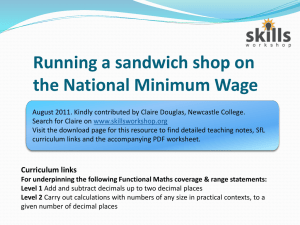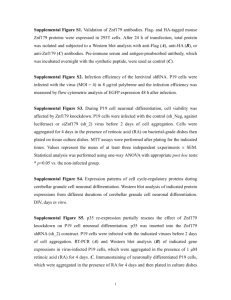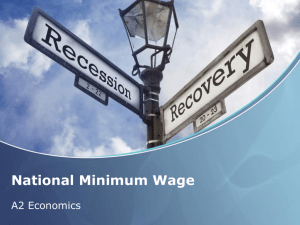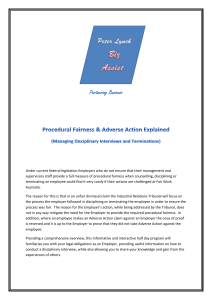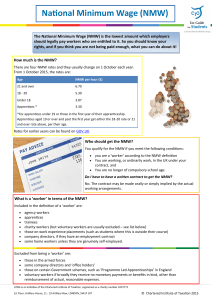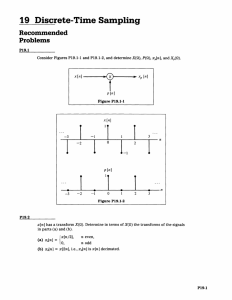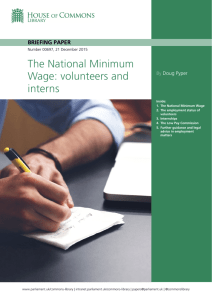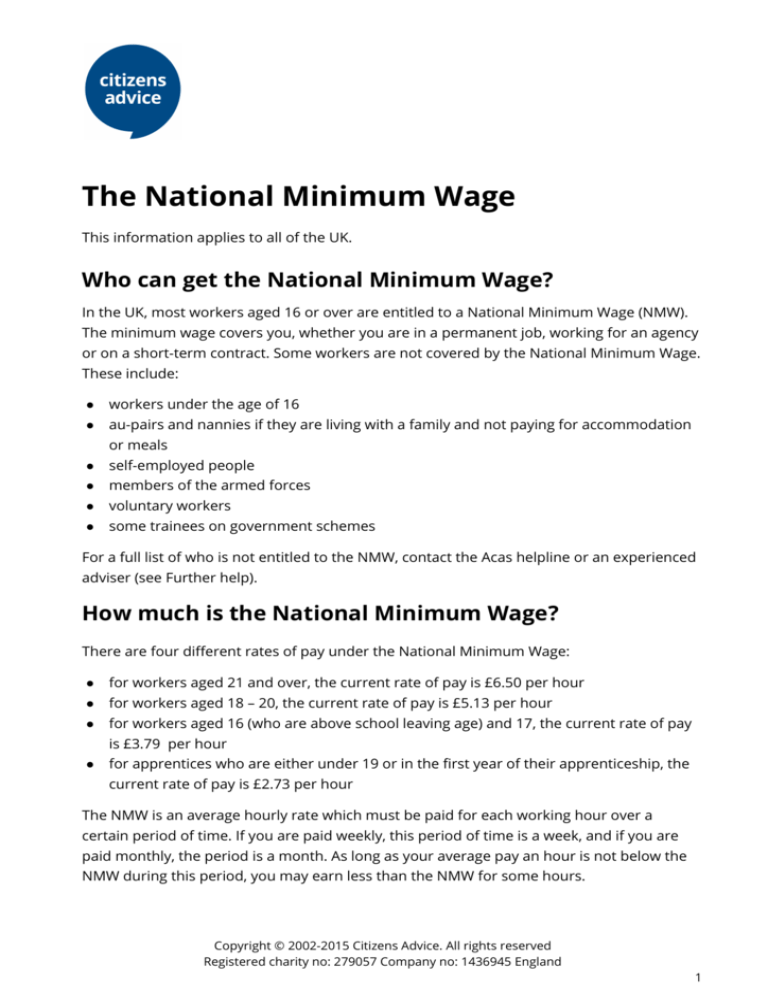
The National Minimum Wage
This information applies to all of the UK. Who can get the National Minimum Wage?
In the UK, most workers aged 16 or over are entitled to a National Minimum Wage (NMW).
The minimum wage covers you, whether you are in a permanent job, working for an agency
or on a short-term contract. Some workers are not covered by the National Minimum Wage.
These include:
●
workers under the age of 16
●
au-pairs and nannies if they are living with a family and not paying for accommodation
or meals
●
self-employed people
●
members of the armed forces
●
voluntary workers
●
some trainees on government schemes
For a full list of who is not entitled to the NMW, contact the Acas helpline or an experienced
adviser (see Further help).
How much is the National Minimum Wage?
There are four different rates of pay under the National Minimum Wage:
●
for workers aged 21 and over, the current rate of pay is £6.50 per hour
●
for workers aged 18 – 20, the current rate of pay is £5.13 per hour
●
for workers aged 16 (who are above school leaving age) and 17, the current rate of pay
is £3.79 per hour
●
for apprentices who are either under 19 or in the first year of their apprenticeship, the
current rate of pay is £2.73 per hour
The NMW is an average hourly rate which must be paid for each working hour over a
certain period of time. If you are paid weekly, this period of time is a week, and if you are
paid monthly, the period is a month. As long as your average pay an hour is not below the
NMW during this period, you may earn less than the NMW for some hours.
Copyright © 2002-2015 Citizens Advice. All rights reserved
Registered charity no: 279057 Company no: 1436945 England
1
Working hours which count for the NMW will only include time spent 'on call' or time spent
overnight at the workplace if you are actually awake and working during those hours – for
example, if you have to perform duties through the night, such as a night watchman or
night sleeper at a care home.
If your employer is not paying the National Minimum Wage
If you think you should be getting the NMW but aren't, you can ask your employer to tell
you why not. It may be that your employer did not realise they were not paying the NMW.
Your employer can get information from the
Acas helpline
(see Further help). If you are a
member of a trade union, you could ask for advice from your representative.
You can't be forced to agree to a wage which is lower than the NMW. If your employer has
tried to force or persuade you to sign an agreement which gives you less than the NMW,
this agreement will not be legally binding. If your employer will not talk about the NMW, or
you don’t feel able to approach them, you can contact the Acas helpline or talk to an
experienced adviser (see Further help).
If you think your employer is aware of the NMW and is not paying it, or you've been forced
into an agreement that pays you less than NMW, you can get advice about your options
from the Acas helpline. The service is confidential and you don't have to give your name.
Most workers have the right to get the NMW by making a claim for unlawful deduction of
wages to an employment tribunal. However, if you're an employee, it's a good idea to raise
a written grievance with your employer first if there is time to do so before the time limit
runs out. If you're not an employee but are entitled to NMW, for example, if you're a
subcontractor, freelancer or casual worker, you can take your claim straight to an
employment tribunal. There are strict time limits for making a claim to an employment
tribunal (see below). You don't need to have worked for your employer for any particular
length of time in order to make a claim.
What you can do if you are bullied or dismissed for
complaining about National Minimum Wage
If you feel you are being bullied or unfairly treated at work, or if you have lost your job
because you reported your employer, you may be able to make a claim to an
employment
tribunal
for harassment, or to sue your employer for breaking your contract of
employment (
breach of contract
). You should not think about doing either of these things
without talking to an experienced adviser or employment solicitor first (see below). If you
want to stay in your job, you also need to think about the effect that taking this kind of
action might have on your relationship with your employer.
Copyright © 2002-2015 Citizens Advice. All rights reserved
Registered charity no: 279057 Company no: 1436945 England
2
Time limits for making a claim to an employment tribunal
If you want to make a claim to an employment tribunal, you've only got three months minus
one day from the date the thing you're complaining about last happened. The time limit
applies even if you're raising a grievance or appealing against a decision. The Acas early
conciliation scheme starts on 6 April 2014 and applies to most employment tribunal claims.
You must use this scheme from 6 May 2014. It's important to get help from an experienced
employment adviser as soon as you can to make sure you don't miss the deadline.
Copyright © 2002-2015 Citizens Advice. All rights reserved
Registered charity no: 279057 Company no: 1436945 England
3
Further help
Local Citizens Advice You can get free face-to-face advice to help you solve problems at your local Citizens Advice
bureau. The service is confidential, impartial and independent. Use the ‘Find your local
Citizens Advice’ box at
www.
citizensadvice.org.uk
or look in the phone book to find a
bureau near you, including those that give advice by email.
Acas Helpline
The Acas helpline is a confidential helpline which can advise you on your rights and the
National Minimum Wage. You can contact the helpline on 0300 123 1100 (text relay is 18001
0300 123 1100).
GOV.UK
You can find further information on the NMW on the GOV.UK website at www.gov.uk.
TUC website
The TUC has launched an online minimum wage calculator to help work out whether you
are being paid the NMW. The calculator can be found on the TUC's worksmart website at
www.worksmart.org.uk.
Other information on citizensadvice.org.uk which might help
● Holidays and holiday
pay
●
your pay
Rights of working
fathers
● Employer withholds
●
Maternity rights
at work
● Resolving disputes at
work
This fact sheet was last updated on 10th June 2015.
If you got it some time ago, contact your local Citizens Advice to check if it’s still correct, or visit
www.citizensadvice.org.uk
to download an up-to-date copy.
This fact sheet is produced by
Citizens Advice, an operating name of The National Association of
Citizens Advice Bureaux. It is intended to provide general information only and should not be
taken as a full statement of the law.
Copyright © 2002-2015 Citizens Advice. All rights reserved
Registered charity no: 279057 Company no: 1436945 England
4

